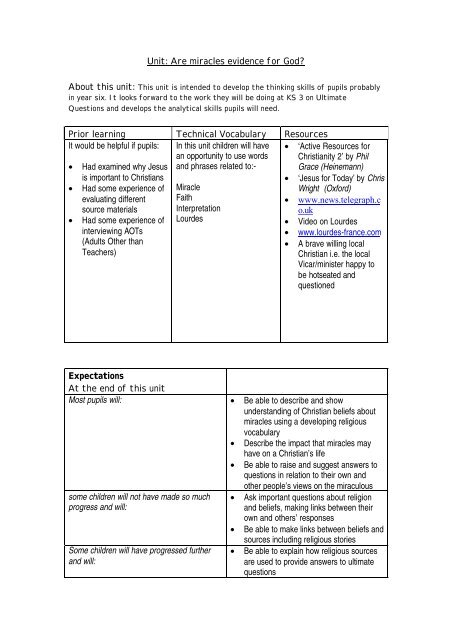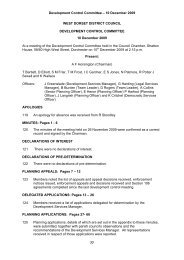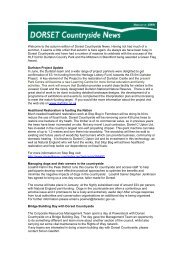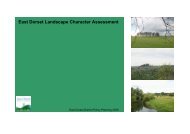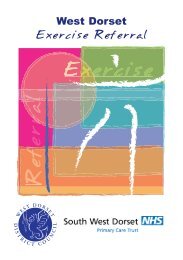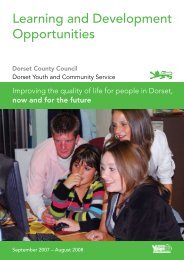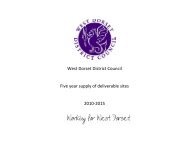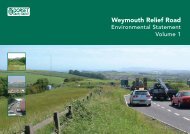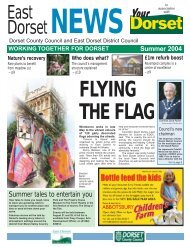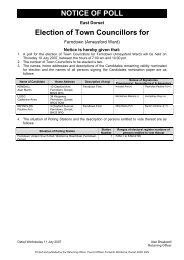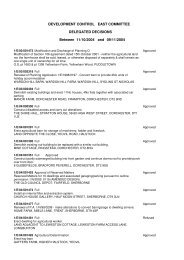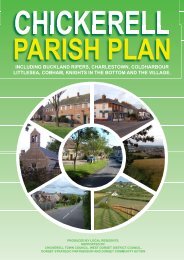KS2 Are miracles evidence for Gods existence - Dorsetforyou.com
KS2 Are miracles evidence for Gods existence - Dorsetforyou.com
KS2 Are miracles evidence for Gods existence - Dorsetforyou.com
- No tags were found...
Create successful ePaper yourself
Turn your PDF publications into a flip-book with our unique Google optimized e-Paper software.
• Be able to suggest reasons <strong>for</strong> thedifferent Christian interpretations of<strong>miracles</strong>• Be able to express their own views andthose of others in relation to <strong>miracles</strong>
Learning Objectives Possible Teaching Activities Learning out<strong>com</strong>es Contribution to otherCurriculum <strong>Are</strong>asPupils should:• Explore the meaning of the termmiracle• Consider different responses tothe miraculous• Reflect on their views of themiraculousWhat is a miracle?• Investigate the differencebetween a magic trick and amiracle.• Per<strong>for</strong>m a simple magic trick – isthis a miracle? Why not?• Ask the question – what is amiracle? Can they <strong>com</strong>e up witha definition?• In groups look at a range ofnewspaper articles describing amiraculous event e.g.www.news.telegraph.co.uk(type in <strong>miracles</strong> into searchengine)• Pupils are to consider thefollowing questionsPupils should be able to:• Raise and suggest answers toquestions about <strong>miracles</strong>• Describe the impact thatexperiencing <strong>miracles</strong> may haveon a person’s lifeLiteracyThinking skills- Do they consider these tobe <strong>miracles</strong>?- <strong>Are</strong> there any otherexplanations?- Why would some peopleconsider these to be<strong>miracles</strong>- What effect wouldexperiencing these<strong>miracles</strong> have on the
people involved?Pupils should:• Learn about the <strong>miracles</strong> of Jesussuch as the feeding of the 5000• Reflect on the significance of thequestions that accounts of<strong>miracles</strong> raise <strong>for</strong> Christians andothers.Was Jesus a miracle worker?• Give out a copy of one of Jesus’<strong>miracles</strong> e.g. The feeding of thefive thousand (Luke 9:12-17)• Using the Lipman method ofphilosophical discussion, pupilsare to reflect on and discuss thisaccount. This should follow thefollowing <strong>for</strong>mat:- Each pupil is to read the accountof this miracle- Each pupil should think of onequestion that the account raises- In their groups, pupils shouldlisten to each other’s question- They should then decide on onequestion to focus on- One pupil should explain theiropinion on this question. Pupilsshould then take it in turns toexplain their own views on thisquestion- They should use the <strong>for</strong>mat ‘Iagree/disagree with (name ofprevious pupil) because…- Each student should then decidewhat they think about thisPupils should:• Describe/showunderstanding/explain an accountof one of Jesus <strong>miracles</strong>• Ask/raise/suggest answers toquestion on issues raise by anaccount of a miracle• Apply/express their own ideas/ toissues connected with <strong>miracles</strong>Thinking skills
accountPupils should learn about:-• A modern miracle i.e.Lourdes• Contemporary Christianviews on <strong>miracles</strong>• Reflect on their own reactionsto modern <strong>miracles</strong> andChristian responses tocontemporary <strong>miracles</strong>(Active Resources <strong>for</strong> Christianity 2explains this approach in detail)• What do Christians believe thismiracle shows about Jesus?• What effect would experiencingthis miracle have had on thepeople involved?Why are <strong>miracles</strong> important toChristians?• Give background in<strong>for</strong>mationabout Lourdes (if possible showa video clip)• www.lourdes-france.<strong>com</strong>includes a webcam from thegrotto!• Discuss their own views on thisaccount• Explore why <strong>miracles</strong> areimportant to Christians – whatdifference may they make to aChristian’s life?• Interview a local Christian abouthow they would respond toBiblical and modern <strong>miracles</strong>Pupils should be able to:-• Describe/showunderstanding/explain an accountof a modern miracle• Describe/showunderstanding/explain ofcontemporary Christianresponses to an account of amodern miracle• Ask/raise/suggest answers toquestion on issues raise by anaccount of a miracle• Apply/express their own ideas/ toissues connected with <strong>miracles</strong>Opportunity <strong>for</strong> spiritual and Culturaldevelopment
Pupils should:-• Consider different responses tothe miraculous• Reflect on their views of themiraculousWhat might <strong>miracles</strong> show aboutGod?• What might the fact that there are<strong>miracles</strong> show about God?• Give pupils a list of adjectives e.g.kind, caring, loving, cruel, unfairetc• Pupils have to choose anadjective that they think bestdescribes a God that per<strong>for</strong>ms<strong>miracles</strong>. They must justify theirchoices.• Pupils are to write questions thatthey would like to ask God about<strong>miracles</strong>• Possible hot seat activity <strong>for</strong>someone to try to answer thesequestions on God’s behalfPupils should be able to:• Raise and suggest answers toquestions about <strong>miracles</strong>• Describe the impact thatexperiencing <strong>miracles</strong> may haveon a person’s lifeLiteracy
Suggested Assessment Task:Pupils are to produce a radio/TV broadcast about one of Jesus’ <strong>miracles</strong>or Lourdes. This broadcast must contain:• A short description of this miracle• An interview with someone who witnessed this miracle and how itaffected their life• An interview with a Christian about what they believe about thismiracle• An interview with a sceptic about what they believe about thismiracle


